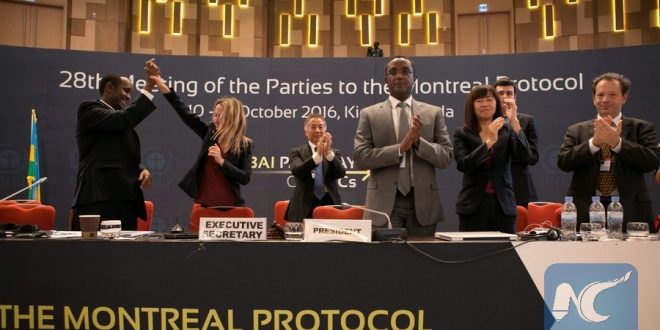Envoys of more than 170 countries in Kigali, Rwanda on 15 October 2016 agreed to phase down use and production of potent greenhouse gases, hydrofluorocarbons (HFCs) by 2045. The agreement amends the 1987 Montreal Protocol on Substances that depletes the Ozone Layer.
Officials meeting in Rwanda over the past week approved the amendment late last night, requiring richer nations to begin curbing HFC use from 2019, while developing countries will begin to curb their HFC use from the late 2020s.
Some environmental groups said the phased approach, which gives China until 2029 to peak its HFC use and India until 2032 to deliver a 10 percent cut in HFC emissions, was not ambitious enough.
But politicians hailed the agreement as a major breakthrough in efforts to tackle climate change, building on last year’s Paris Agreement and the recent deal to introduce emissions pricing across the global aviation industry.
“It’s a monumental step forward, that addresses the needs of individual nations but it will give us the opportunity to reduce the warming of the planet by an entire half a degree centigrade,” U.S. Secretary of State John Kerry told BBC News.
Miguel Arias Cañete, EU Commissioner for Climate Action and Energy, said the deal was “a huge win for the climate.”
“We have taken a major concrete step in delivering on the promises we made in Paris last December,” he said. “The global phase-down we have agreed today could knock off up to half a degree of warming by the end of the century.”
HFCs are one of the most powerful greenhouse gases and their use is soaring as developing countries step up their demand for refrigeration and cooling. However, experts maintain that cost-effective alternatives are available and that the same functionality can be achieved without emitting HFCs.
Christian Aid’s senior policy advisor, Benson Ireri, said the deal meant governments had passed the “first real test faced by nations since they committed to limiting global warming in the Paris Agreement.”
“HFCs posed an immediate threat to a safe climate due to their increasing use and high global warming potential, thousands of times more potent than carbon dioxide,” he said. “By agreeing to an early HFC phasedown schedule, we’ve bought ourselves a bit more time to shift to a global low carbon economy and protect the world’s most vulnerable people.”
He added that while it was a shame India and a handful of other countries chose a slower time frame for phasing down HFCs, there was growing evidence a faster phase down could be achieved.
“It’s highly likely that innovation and market forces mean the world actually beats these targets anyway,” he said. “That is what has happened with previous targets agreed at the Montreal Protocol, so hopefully that happens again.”
The revision to the global treaty holds out the prospect of new national legislation to curb HFC use in many countries around the world, alongside a renewed focus on accelerating the roll out of so-called natural refrigeration technologies.
Agencies/Canadajournal
 Canada Journal – News of the World Articles and videos to bring you the biggest Canadian news stories from across the country every day
Canada Journal – News of the World Articles and videos to bring you the biggest Canadian news stories from across the country every day



